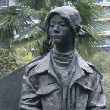
we always enjoy ourselves.we后面可以加are吗?
推荐于2016-09-12 · 知道合伙人教育行家
 wangpanyong110
wangpanyong110
知道合伙人教育行家
向TA提问 私信TA

we always enjoy ourselves.we后面不可以加are.we always enjoy ourselves.已经是一个完整的句子,所以不可以加are.
英语中最基本的五种句子结构如下:
Subject (主语) + Verb (谓语)
这种句型中的动词大多是不及物动词,这些动词常见的有:appear,apologize,arrive,come,die,disappear,exist,fall,happen,rise,等等.如:
The students work very hard.学生们学习很努力。She apologized to me again.她再次向我道歉。
The accident happened yesterday evening.事故是昨天晚上发生的。
2.Subject (主语) + Link.V(系动词) + Predicate(表语)
这种句型中的系动词一般可分为下列两类:
(1)表示状态的连系动词.这些词有:be,look,seem,appear,smell,taste,sound,keep,remain,等等.如:
Several players lay flat on the playground.几个队员平躺在操场上。
We should remain modest and prudent any time.我们在任何时候都应该保持谦虚谨慎。
This kind of food tastes terrible.这种食物吃起来很糟糕。
The picture looks more beautiful at a certain distance.这幅画在一定的距离看更漂亮一些。
(2)表示转变或结果的系动词.这些词有:become,get,grow,turn,go,come,prove,等等.如:
Spring comes.It is getting warmer and warmer.春天到了,天气变得越来越暖和。
Don't have the food.It has gone bad.不要吃那种食物,已经变质了。
The facts prove true.事实证明是正确的。
3.Subject(主语) + Verb (谓语) + Object (宾语)
这种句型中的动词应为及物动词或者可以后接宾语的动词短语.同时,句子中有时含有与宾语有关的状语.作宾语的成分常是:名词、代词、动词不定式、动名词或从句.如:
You can put the books in your bag.你可以把书放在书包里。
Farmers in our area grow lots of vegetables.我们这里的农民种很多种蔬菜。
She lost the chance to make her appearance on the stage.她失去了在舞台上露面的机会。
I prefer to make web pages.我更喜欢做网页。
4.Subject(主语)+Verb(谓语)+ Indirect object(间接宾语)+Direct object (直接宾语)
这种句型中作间接宾语的常常指“人”,直接宾语常常指“物”.如:
Yesterday her father bought her a bicycle as a birthday present.昨天她父亲给她买了一辆自行车作为生日礼物。
The old man is telling the children stories in the Long March.老人正在给孩子们讲长征中的故事。
这种句型还可转换为其他两种句型:1)动词 + 宾语 + for sb.; 2)动词 + 宾语+to sb..如:
Please show me your picture.
-Please show your picture to me.
请把你的画给我看一下。
I'll offer you a good chance as long as you dont lose heart.
—I'll offer a good chance for you as long as you don't lose heart.
只要你不失去信心,我会给你提供机会的。
5.Subject(主语)+Verb (动词)+Object (宾语)+Complement(补语)
这种句型中的宾语+ 补语可统称为“复合宾语”.担任补语的常常是名词、形容词、副词、介词短语、分词、动词不定式等.如:
Keep the children quiet,please.请让孩子们安静下来。
He painted the wall white.他把墙漆成白色。We found him an honest person.我们发现他是一个诚实的人。
His mother told him not to play on the street.他母亲告诉他不要在街上玩。
注意:动词have,make,let,see,hear,notice,feel,observe,watch等后面所接的动词不定式作宾补时,不带to.如:
The boss made him do the work all day.老板让他整天做那项工作。
enjoy是动词,及物动词,直接做谓语,we enjoy + 名词
如果说到are的话, am is are 都是be动词,后面接形容词,或者名词等,就是不能直接接动词(及物动词或不及物动词)

